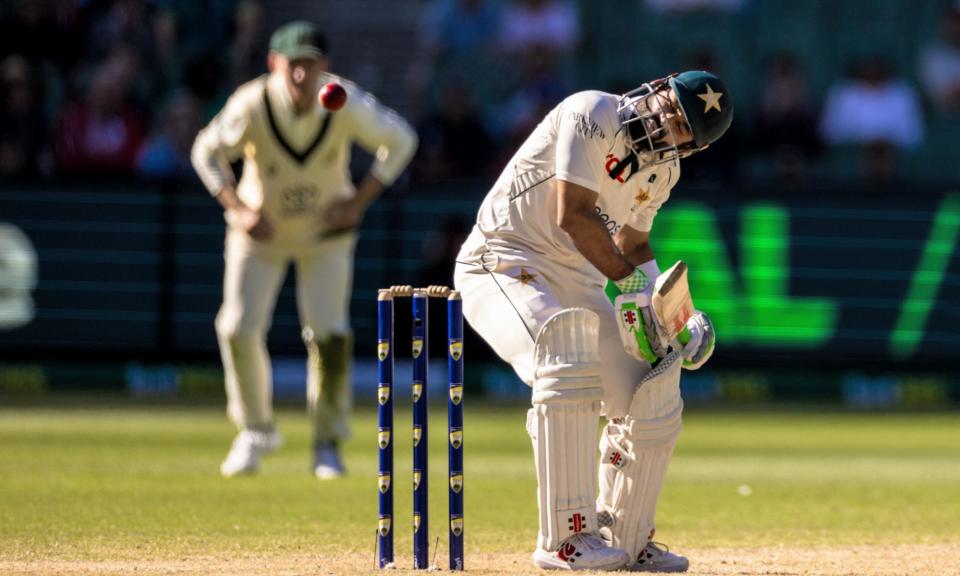
If you have spent some of your summers watching Pakistan play Tests in Australia, you might have a feeling known to schoolteachers. Anyone in charge of students can tell you about the most frustrating ones: the ones who are bright and interesting but for one reason or another just can’t get things together.
They act out, they’re unpredictable, and the most frustrating part is that this includes at times living up to their potential. They might knuckle down for a while, get their test scores up. Then on the last day of term they steal a bunch of chemicals from the science lab to burn down the bike shed.
Related: Superb Pat Cummins spell gives Australia dramatic Boxing Day Test win
So it was to end the Boxing Day Test, when the chance of a day five thriller went up in smoke on an extended day four. In sport you want to see the unexpected, the fresh, the original. Pakistan haven’t won a Test match in Australia since 1995, and never a series. They had the chance in Melbourne to correct one of those results and leave open the prospect of the other. The possibility existed all through the four days, from the moment the coin fell Pakistan’s way until that disastrous last hour.
It wasn’t that they were ever favourites chasing 317, needing almost as many batting fourth as Australia made batting first. But there were moments of possibility. At 110 for 2, with new captain Shan Masood purring and former captain Babar Azam hacking his way back into some kind of form. At 162 for 4, when the relatively new but ultra-consistent Saud Shakeel was getting set. And especially at 219 for 5, when Mohammed Rizwan and Agha Salman brought the target down into double figures.
The Australians must have felt some worry. Rizwan, the sprightly wicketkeeper, was playing in his enterprising way, cracking shots through cover and taking on the pull. Salman is batting at seven to bowl spin but is far better with the blade than your usual all-rounder. The prospect loomed of those two getting to stumps needing 70 or 80 to win on day five, a prospect that would have cost Pat Cummins some sleep.
Instead the Australian captain brought himself back on for a hostile spell of short stuff, drawing a marginal caught decision against Rizwan, then bombing out the previously stubborn Aamer Jamal. At seven wickets down the umpires were allowed to extend time by half an hour, enough for Cummins and Mitchell Starc to clean up the rest. The bottom four entries on Pakistan’s scorecard read 0, 0, 0 not out, 0.
It wasn’t just the last day when Pakistan had a chance. Even at 187 for 3 after the first day, it felt like they had held Australia almost in check. Seven wickets in the first session of day two finished that job. But among those successes were failings like conceding 52 extras, bowling the wrong lengths on morning one, dropping David Warner before he batted for two hours and giving away too many runs quickly on morning two.
In their second bowling effort, dropping another catch off Mitchell Marsh was the obvious turning point – Australia would have been five down for 46, with Alex Carey coming in under huge pressure. Instead Marsh was able to make 96, holding back Carey to play the kind of innings at which he has become so adept, an enterprising 53 with the tail from a stronger position. Had any of these things gone differently, the game might have done the same.
Related: Australia beat Pakistan by 79 runs in Boxing Day Test – as it happened
And of course once the target was set, a home win was always the likelihood, up against a fast-bowling trio that can make an argument for being Australia’s historical best. Hazlewood has resumed service as a metronome, Starc improves as a Test bowler the later his career goes and Cummins here found a way to intervene whenever he was needed. Ten wickets in the match for the second time in his career has taken him past 250. Two more successful years might take him into the 300s, tracking Dennis Lillee as second for Australian quicks behind Glenn McGrath.
So it is impressive that this Pakistan team, far less experienced and less accomplished, were able to take it up to Australia. They fought through all four days, and a lineball adjudication against Rizwan might have been the margin. It opened up the lower order to getting bombed in fading light on a pitch with tricky bounce, where their collective fall was through lack of skill rather than application.
You might say that correcting the slip-ups is what will take Pakistan from here to being an accomplished side. But even so, they nearly had it. Then they didn’t. That’s the frustration.
Article courtesy of
Source link